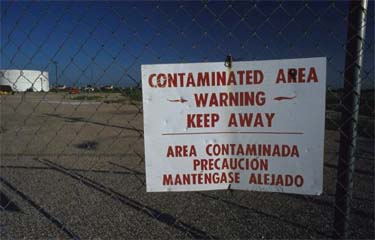 |


|
|
Developing Countries Learn to Limit Chemical Risks
|
|
Environmental News Service ROME, Italy, (ENS) - Officials from over 100 governments concerned with reducing the risks of chemical use, particularly in developing countries, have been meeting in Rome this week to prepare for the entry into force of a global treaty to govern these risks.

Delegates conclude a week long meeting tomorrow on the Rotterdam Convention on the Prior Informed Consent Procedure (PIC). The treaty deals with certain hazardous chemicals and pesticides in international trade, and limits the introduction of hazardous chemicals and pesticides into countries that cannot safely manage them. Adopted in 1998 under the auspices of UNEP and FAO, the Rotterdam Convention uses the prior informed consent procedure to help governments decide whether to accept or refuse the imports of certain hazardous chemicals. Countries that export such chemicals will have to respect the decisions of importing parties. Some 70,000 different chemicals are available on the market, and 1,500 new ones are introduced every year. In a joint statement the United Nations Environment Programme (UNEP) and the UN Food and Agriculture Organization (FAO) said, "This poses a major challenge to many governments who must attempt to monitor and manage these potentially dangerous substances. Many pesticides that have been banned or whose use has been severely restricted in industrialized countries are still marketed and used in developing countries." David Harcharik, FAO deputy director-general, said, "Global agreements such as the Rotterdam Convention serve to provide a level of control and can help to mitigate the negative effects of globalization." Pending the entry into force of the Rotterdam Convention, governments have agreed to apply the PIC procedure on a voluntary basis. The processes developed are operational, with three additional chemicals and two severely hazardous pesticide formulations identified as candidates for inclusion in the interim PIC procedure. Recognizing the problem of illegal trafficking in controlled chemicals, a start has been made towards the establishment a working group to govern illegal trafficking under the Inter-Organization Programme for the Sound Management of Chemicals (IOMC).
The Rotterdam Convention was adopted and signed by Ministers and senior officials on September 11, 1998. It has received 73 signatures. To date 16 governments - Bulgaria, Czech Republic, El Salvador, Germany, Guinea, Hungary, Kyrgyzstan, Mongolia, the Netherlands, Nigeria, Oman, Panama, Saudi Arabia, Senegal, Slovenia and Suriname - have ratified, accepted, approved or acceded to the Convention. It will enter into force 90 days after the 50th ratification. Harcharik urged countries to work towards ratification of the Rotterdam Convention in time for the World Summit on Sustainable Development in September 2002. |

© 1997-2002 BEI
 A preliminary meeting to start the work of the IOMC group was held in Geneva on August 27. The delegates concluded that a broader meeting to establish the IOMC working group should be held in December. In preparation, UNEP will collect information on issues related to illicit trafficking, responsibility and liability.
A preliminary meeting to start the work of the IOMC group was held in Geneva on August 27. The delegates concluded that a broader meeting to establish the IOMC working group should be held in December. In preparation, UNEP will collect information on issues related to illicit trafficking, responsibility and liability.